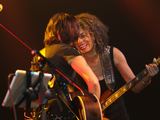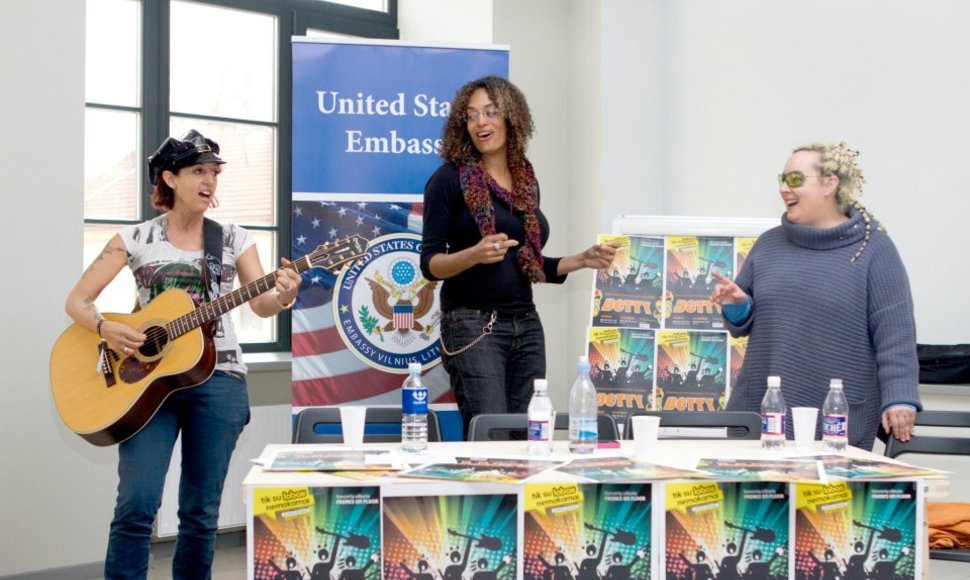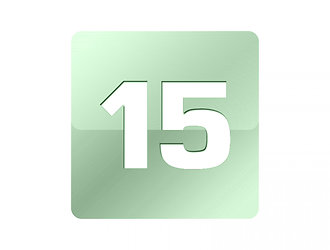What’s your impression being here in Vilnius and Lithuania?
Alyson: So far it’s been beautiful. People have been very friendly, although a little bit more distant than we’re used to in the States.
Elizabeth: It’s really interesting to be in the Baltic States. We’ve only been here for one day, so it’s hard to have a general idea, but we’ve met some really interesting people. It’s a beautiful small city.
How did you end up visiting the Baltic States?
 |
| Vytauto Valentinavičiaus nuotr./Betty concert in Vilnius |
Alyson: A dear friend of ours who we worked with on a show in New York City is now working here in the US Embassy. The more our friend talked about this place the more intrigued we were because none of us had ever been to a Baltic State. We love the connection between the US and Lithuania. We love that we’re such strong partners in the world, and we thought let’s be partners culturally, too.
What message would you like to give to Lithuania?
Amy: We want to give a great time to people who come and see us perform. We would love to open up discussions, to exchange different ideas about culture and life, gender equality, politics and so on.
Elizabeth: And to show people that there’s different types of Americans, because people have a very different idea of what America is. Just like I didn’t really have much of an idea about Lithuania. I think the best way to understand about a different culture is to actually meet people and to interact with them.
What aspects of US culture would you like to show to Lithuanian people?
Amy: I think it’s great to have the chance to be a representative of the US by doing a concert, and I think aspects of our culture come through in our performance: the humour, the sensibility, the language, the aesthetic.
 |
| Vytauto Valentinavičiaus nuotr./Betty concert in Vilnius |
Alyson: Even though women are a majority, we’re still a marginalised group generally in the world, so I’m always excited about women coming together to perform together.
Elizabeth: It’s important to understand that the US is very diverse. There are so many different cultures, it’s not homogenous. We’re not homogenous either: we’re Jewish and black and from different cultures ourselves, and I think it’s important for people to see that we get along, we’re good friends and create art together.
Do you see that artists have a responsibility to affect change?
Amy: Yes, absolutely. It’s both our right and our responsibility.
Alyson: Some artists do, but some artists are more insular and not necessarily making their art for the world.
Elizabeth: I think it just happens when you meet people one on one, or even in a concert situation, and you relate to them: they respond to you and you respond to them.
Who is the audience of Betty?
Amy: We’re lucky to have many different types of fans. People who like Betty are very diverse: from children to older people, black, white, gay, straight…
 |
| Vytauto Valentinavičiaus nuotr./Betty concert in Vilniu |
Alyson: The one thing our audience has is common is that generally they’re people who are tolerant. Because our audience is so wide you’ll be rubbing elbows with someone who is different from you, so you have to be tolerant.
And do your listeners concentrate more on the music or the message?
Amy: I don’t think there’s a message in our music. I think it’s just music.
Alyson: I have to disagree. I think the message of our music is basically enjoy life. We don’t hit people over the head with things. It can be suffocating for your music and lyrics to try to fit messages in all the time. Basically people come and are entertained, and only when you’re reflecting on it later you see what the message is.
Elizabeth: We are also independent artists, which frees us from having responsibility towards a company or sponsor. It’s interesting to write about our experiences and the people we meet. We might write a song about Vilnius!
 |
| Vytauto Valentinavičiaus nuotr./Betty concert in Vilnius |
Speaking of inspiration, who and what inspires you to keep on singing and be involved in different social projects?
Elizabeth: I’m inspired just by need. I’ve always been an artist, and we’re lucky that we’ve been able to make a living out of it. I’m inspired by literature, beauty, and so many people whom I respect.
Amy: I’m inspired by people who work hard, play hard and love hard. Passion is inspirational.
Alyson: I think I’m inspired most by my children now. And our most fervent fans.
You’ve been supporters of the LGBT movement, AIDS victims and other causes from the beginning of your career. How did you become involved with these issues?
Alyson: We saw friends dying of AIDS, and it seemed that nothing was happening about it fast enough. We had to be vocal.
Amy: Nobody had information, and there was a lot of misinformation. Fear was taking over.
Elizabeth: It seemed really taboo to be talking about AIDS at the time, but we saw people coming together, especially women. A support system was created, clinics sprang up. It was very radical, there was a lot of activism. The way women came together is what’s happening now with breast cancer.
 |
| Vytauto Valentinavičiaus nuotr./Betty concert in Vilnius |
Alyson: It showed how from the bottom up you can change the government’s position.
In Lithuania, only one well known musician, Erica Jennings, came to support Baltic Pride 2010 held in Vilnius. How was the situation in the US when you started to support LGBT rights?
Alyson: Nobody talked about it. They were afraid people would think they’re gay and that it would be the end of their career. The first person I remember was Debbie Harry of Blondie. And after her, other people started getting involved, too.
Elizabeth: Now when you go to Gay Prides, it’s a big party sponsored by huge companies, so it’s a big financial boost to have the gay community behind you in the US. That’s when things start changing.
What is your view of bands and musicians who spread the opposite message to yours?
Alyson: The biggest one I can think of right now in the US is Ted Nugent, who uses his music as a platform to spread hate and bigotry. But he has the right to his position. There needs to be freedom of speech, and it has to work both ways.
 |
| Vytauto Valentinavičiaus nuotr./Betty concert in Vilnius |
Amy: I like that offensive lyrics create discussion.
Alyson: There’s huge discussion now about the words ‘fag’ and ‘bitch’. People are standing up to say you can’t use these misogynistic and homophobic terms.
You have collaborated with different people and social groups, for example well known feminists. Do you think this is important for making change?
Alyson: It’s absolutely important. The only way to make change is to support each other.
Amy: You can’t be a real feminist without striving for anti-homophobic and anti-racist legislation. How can you be for one thing and not be inclusive of everybody?
Alyson: The first wave of feminism was a white woman’s issue, but later, when white and black women came together, is when things really moved forward.
Amy: You can’t stay silent when others around you are being repressed.
What are your memories from the early years of Betty?
Alyson: Betty started in 1986 in the Washington DC area when we were in college. Amy and Elizabeth put an ad on the radio for a base player. I heard the ad and went to audition and basically never left. We clicked instantly. We’ve had so many adventures over the years.
Elizabeth: We’ve been together for so many things, good and bad – we’re a real family.
Amy: One of the very first shows the three of us did as Betty was when we opened for a big electronic band called the Art of Noise. They made the audience wait for over two and a half hours, and didn’t tell them that there was an opening band. By the time we got on stage everyone in the audience hated us. They were waiting for the Art of Noise and then we come out in sparkly ball gowns and started singing a cappella. After our 20-minute set we escaped from the stage!
How do you find balance between the different roles in your life, like being a touring musician and a family member?
Alyson: It’s really hard, but nothing that I’m doing is any different than what any working woman does. We have to make choices, and try and swallow the guilt.
Elizabeth: It’s not hard for me at all. I love travelling and meeting new people. It’s a great life, I’m really lucky.
Amy: You always have to strive for a balance, whether you’re an artist or doing any other job. Personally, I have found a great balance. I’m excited to go travelling and I’m excited to go home to the person I love.
And how do you see your future, will Betty continue to perform?
Amy: I hope so!
Alyson: There’s still so much we want to say, there’s still so much we haven’t seen, there’s still so much we have to learn.













